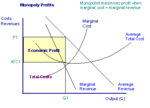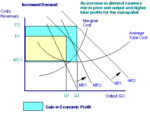Well I don't particularly disagree with anything in your last post:
http://www.trade2win.com/boards/eco...is/133422-keynes-vs-hayek-95.html#post1957442
However, the ethics or causes of war are not the question I was asking.
I am referring purely to the ability to pay for war.
Gold standard in the modern era is impractical in times of war.
That was the main point of my post:
http://www.trade2win.com/boards/eco...is/133422-keynes-vs-hayek-95.html#post1957346
You say as much in the post I refer to:
http://www.trade2win.com/boards/eco...is/133422-keynes-vs-hayek-92.html#post1957148
That is my question, summarised below:
War is a constant in history, and will be in the future.
Gold standard can not be maintained in times of war.
That is the primary weakness of the gold standard.
In other words a gold standard system does not suit all conditions.
In modern history, a fiat system has pretty much always been adopted to pay for a war.
Note that does not mean I think fiat systems are perfect.
What are you thoughts on that?
I do understand your position. I am simply leading up to an answer. The topic that you raise does not have a simple, glib, 1 line answer. War incorporates an ethical component, which I have initially considered in the previous post.
Monopoly:
Under a monopoly, the supply of goods and services is reduced, while the cost of said goods and services rises. This fact is starkly apparent across all the Socialist Western governments that seek to expropriate as much of the capitalist systems generated wealth. Their profligacy and incompetence however are gradually killing the goose that lays the golden eggs.
From the true monopoly of government we can move to the fallacy of the ‘monopoly price’.
The model relies on an assumption that is untrue, thus any deduced conclusions are false. This is the assumption that in the market there is a discernible, identifiable competitive price. From this assumption flows the identification of the monopoly price.
Thus the critical question is that at P1, does there exist a competitive price or a monopoly price? The authors are working on the assumption that it is a monopoly price. The truth of the matter is that there is no way of knowing. Contrary to the assumptions of the theory, there is no competitive price which is clearly established somewhere, and to which we can compare P1.
In this diagram increased demand is postulated. From the diagram, an increase in demand at AR2, is shown to increase profits due to a higher price and output at P2, Q2. The truth of this depends upon a perfect inelasticity of the demand curve.
Even if I were to to waive all the difficulties of discovering and identifying a demand curve [and this can only be done by the producer in a tentative manner] the price, if accurately established, will be set by the seller, so that the demand curve above P1 [our original monopoly price] will be elastic, thus assuming perfect inelasticity is an error, and false.
Now let me suppose that the producer decides that only producing Q1 rather than Q2 and thus lowering his marginal costs, that he will make more money as he can still sell at P2, does this signify a monopoly price? Could it not be argued reasonably that the price attained at P2 is rather the movement from a subcompetitive price to a competitive market price? In the real world, the demand curve is not simply handed to the producer, but must be estimated and discovered. Our producer really has no idea whether these prices are subcompetitive, competitive or monopoly. As we have already disposed of the authors original definition, viz. sole producer, I can assert this to be true.
Let’s examine ‘democracy’ as a monopoly, which it actually is:
Monopoly as an analytic a priori proposition: monopoly is an entity [institution] that exists in the absence of any market competition.
Defining ‘monopoly’ as an institution that can as a producer of goods and services [within its market], raise revenues through the restriction of supply: this is and must be due to an inelastic demand curve.
To gain a monopoly position, all competition must be eliminated. Free market mechanisms cannot succeed, nor be utilised to eliminate competition, as free market mechanisms rely upon ‘out competing’ the competition through ‘lower price, higher quality’ or a combination of the two. With ‘free entry’ to the ‘market’ as ‘profit margins rise’ due to an expansion of market share, or product dominance, competitors are attracted to the high returns available, particularly if the demand curve has areas of inelasticity.
Legal mechanisms can be utilised, as they rely upon an outside agency to provide the coercive power required to exclude all and any competition. Thus the only true monopolies are monopolies that exist under conditions of coercion. These monopolies will only possess monopoly power or advantage in an area where they have the support of the coercive power.
The ‘other’ way that monopoly area of influence, or market share can be gained is through the direct use of coercion, or physical force [or the threat of] against any and all competition. Assuming success, the institution then controls the market or territory that they can defend from other potential or actual monopolists.
We now have an area that supports say 100 monopolists, each with a territory that has an inelastic demand curve for our institutions goods and services, which happen to be quite similar in our 100 firms. As ‘competition’ is prohibited, legal power resides with each individual monopolist, the only method to remaining to drive expansion of territorial control and hence an expansion in revenues is through ‘war’.
Of course this is exactly the situation of the ‘State’ which historically consisted of ‘Kings’ and now are ‘governments’. There are some very important differences between the two forms of the ‘State’ however, as far as ‘government’ expansion is concerned, there are only two ways that they can expand their market share, direct war, or the threat of war, resulting in Imperialism.
Through history the theory of monopoly can be seen to drive the ever shrinking number of ‘States’ into ever larger territorial areas that are exploited by monopoly government. There have been stunning reversals, the Soviet Empire imploded of course, but the historical dialectic has been towards consolidation through war and aggression. The inelastic demand curve is inelastic as of course it is 100% coerced. The revenues generated are called ‘tax’.
Monopoly through coercion has a logical conclusion: one world government. Steps have of course been underway for a long time towards this ‘ideal’ using the fiat currency as the primary weapon. Bretton Woods saw the hegemony of the US. drive the implementation of the US dollar as the ‘world reserve’ currency, much as prior to WWI Britain held the unofficial world reserve currency.
The point? The point is this: fiat money provides government with a monopoly on money. It is this monopoly which allows the expropriation of the electorate, which funds governments expansionary dreams.
jog on
duc


